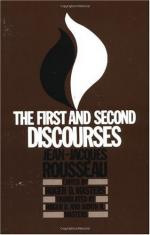
|
| Name: _________________________ | Period: ___________________ |
This test consists of 15 multiple choice questions and 5 short answer questions.
Multiple Choice Questions
1. What displays apparent contradiction between virtue and enlightenment according to Rousseau in the First Discourse?
(a) Monarchy and prisons.
(b) Despotism and freedom.
(c) Government and philosophy.
(d) Sciences and arts.
2. What was the most popular form of government in Europe during Rousseau's time?
(a) Democracy.
(b) Enlightened Despotism.
(c) Monarchy.
(d) Capitalism.
3. What reflects in the science it helped produce?
(a) Intelligence.
(b) Goodness.
(c) Processes.
(d) Evil.
4. What does science prevent the production of according to Rousseau?
(a) Worldly goods.
(b) Weapons.
(c) Good leader.
(d) Good men.
5. What does Rousseau say preceded what men are coming to?
(a) Socratism.
(b) Barbarism.
(c) Enlightenment.
(d) Sophism.
6. What does Rousseau say science inherently is?
(a) Dangerous.
(b) Good for society.
(c) A way to better ourselves.
(d) Captivating.
7. What does Rousseau argue the arts force men to reward people based on?
(a) Intelligence.
(b) Fortune.
(c) Appearance.
(d) Birth.
8. What should the preface of the Second Discourse say philosophers must focus on?
(a) Nature of man.
(b) Inequality between men and women.
(c) Why philosophers are great.
(d) The oppression of the masses.
9. Why does Rousseau reject the notion of natural law?
(a) Locke favors it.
(b) He wants to contradict all the thinkers of his time.
(c) His royalty backers don't like the concept.
(d) We do not yet know the nature of man.
10. What does luxury generate according to Rousseau?
(a) Travel.
(b) Art.
(c) Free time.
(d) Good men.
11. What is Rousseau concerned about in the treatment of the topic of Chapter 1?
(a) Being unfair means favoring the arts.
(b) The difficulty of being fair.
(c) The difficulty of being accurate.
(d) The arguments for and against are the same.
12. Who attacked art and science according to Rousseau?
(a) Hobbes.
(b) Plato.
(c) Aristotle.
(d) Socrates.
13. What does Rousseau argue science often begins with in Chapter 2?
(a) Superstition.
(b) Desire for power.
(c) Need for new weapons.
(d) Lack of knowledge.
14. What is best represented by the "Philosophes"?
(a) Democracy.
(b) The Enlightenment.
(c) The French Revolution.
(d) Changes in the Monarchy.
15. What does Rousseau say that the men will soon require?
(a) Revolution.
(b) Meditation.
(c) Arts.
(d) Patience.
Short Answer Questions
1. How does Rousseau say science produces war?
2. What collapses with riches according to Rousseau?
3. What question does Rousseau try to answer about society?
4. What does Rousseau say at the end of Chapter 1 might contradict virtue?
5. How can what Rousseau say fell apart survive under?
|
This section contains 412 words (approx. 2 pages at 300 words per page) |

|




